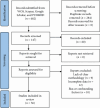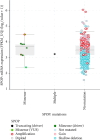Updates on SPOP Gene Mutations in Prostate Cancer and Computational Insights From TCGA cBioPortal Database
- PMID: 40432836
- PMCID: PMC12116119
- DOI: 10.1155/sci5/4084224
Updates on SPOP Gene Mutations in Prostate Cancer and Computational Insights From TCGA cBioPortal Database
Abstract
Speckle-type pox virus and zinc finger protein (SPOP) has emerged as a key focus in prostate cancer research due to its critical role in regulating the androgen receptor (AR) signaling pathway. This review aims to comprehensively summarize current knowledge on SPOP gene mutations in prostate cancer, emphasizing their importance in disease characterization and identification of therapeutic targets. A systematic literature search was conducted across multiple databases, including PubMed, Web of Science, Scopus, and Google Scholar. In addition, this study uses computational approaches and data from the TCGA cBioPortal database to explore the landscape of SPOP mutations in prostate cancer. After screening 682 articles and following systematic selection steps, 56 high-quality articles were included. Computational analysis of TCGA cBioPortal data revealed a SPOP mutation prevalence of 5%-6%, along with significant alterations in AR signaling and epigenetic regulation. SPOP mutations disrupt substrate recognition, leading to dysregulation of downstream pathways such as AR signaling and chromatin remodeling. Notably, SPOP-mutant prostate cancers are mutually exclusive with TMPRSS2-ERG fusions and enriched for Wnt pathway alterations. Patients with SPOP mutations demonstrate prolonged responses to androgen deprivation therapy (ADT), although concurrent mutations in TP53 or DNA repair genes negatively impact outcomes. While their prognostic significance continues to evolve, their impact on the AR pathway highlights their potential as therapeutic targets. The clinical implications of SPOP mutations are substantial, as they are linked to variations in treatment response and disease progression, thus serving as valuable biomarkers for risk stratification and prognosis.
Keywords: SPOP gene; SPOP mutations; TCGA cBioPortal; androgen receptor; prostate cancer; therapeutic targets.
Copyright © 2025 Suleiman Zakari et al. Scientifica published by John Wiley & Sons Ltd.
Conflict of interest statement
The authors declare no conflicts of interest.
Figures





References
-
- CDC. Prostate Cancer . 2023. What is Prostate Cancer? https://www.cdc.gov/cancer/prostate/basic_info/what-is-prostate-cancer.htm .
Publication types
LinkOut - more resources
Full Text Sources
Research Materials
Miscellaneous

